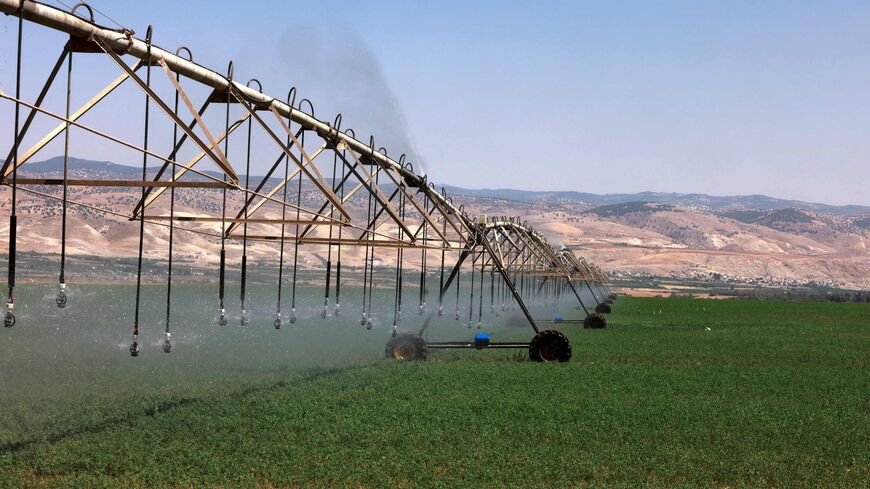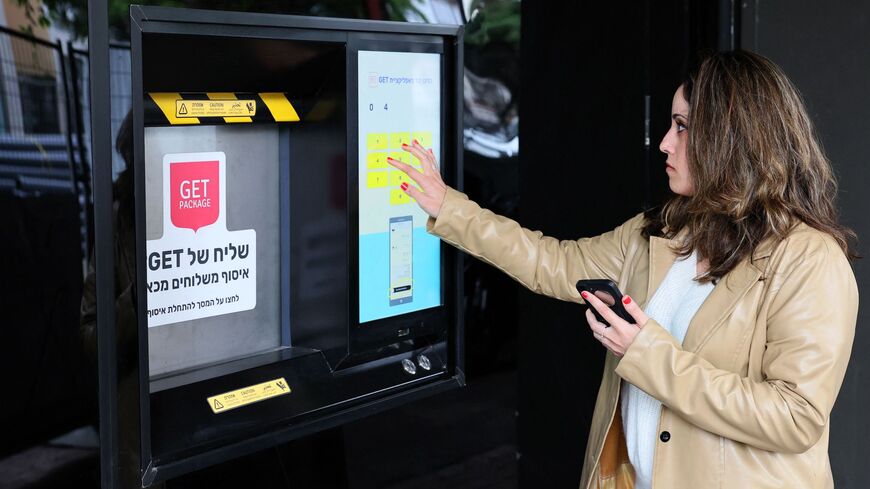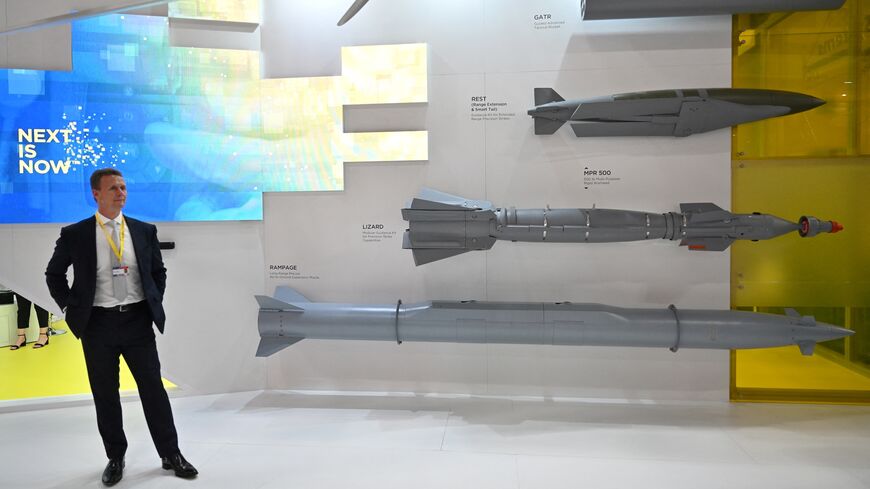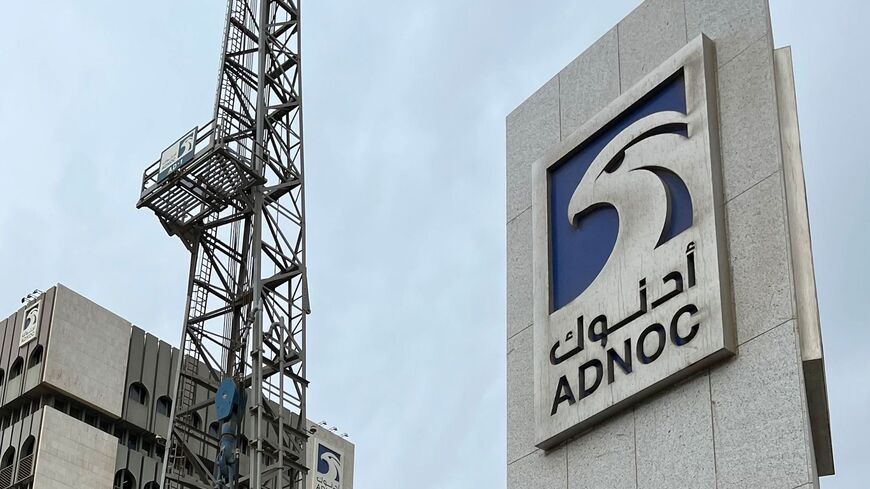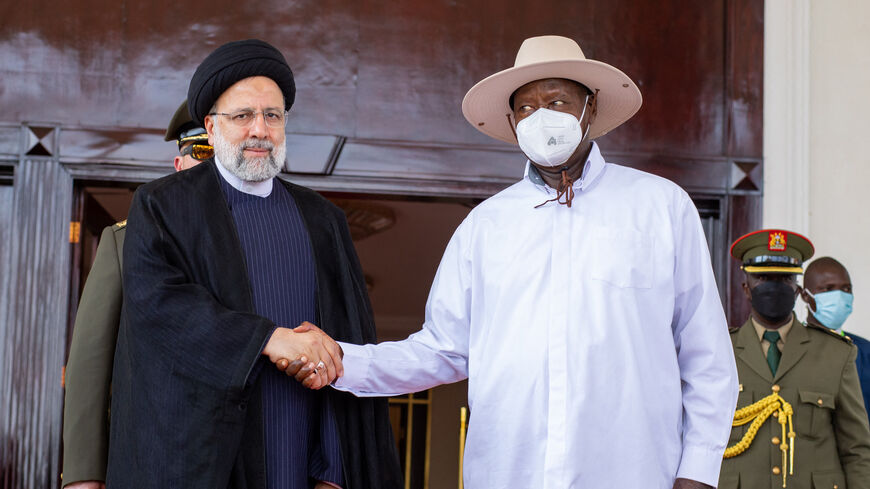Israel’s efforts at water diplomacy make slow progress
Al-Monitor Pro Members
David Rosenberg
Israeli reporter specializing in business, economics and politics
July 31, 2023
Israel is keen on leveraging its water technology and achievements in exploiting limited water resources to build ties with the Arab world. As part of that drive, the government plans to send a 1,000-person delegation to the COP-28 climate conference next November in Dubai. The Abraham Accords have opened opportunities for partnerships in water and climate tech generally between Israel and signatory countries. But while deals have been announced, follow-through has been slow. Political strains since Prime Minister Benjamin Netanyahu’s far-right government took power are undercutting plans for collaboration and knowledge-sharing. However, water collaboration may now gain momentum as necessity increasingly outweighs politics. The July heat wave has pointed up the rapidly developing impact of climate change on Middle East and North African water supplies.
- Faced with severely limited water resources, Israel has developed an advanced infrastructure to leverage supplies and efficiently allocate them. It operates five major reverse osmosis desalination facilities, with a sixth due to open by 2025 and a seventh in planning. Together they supply 585 million cubic meters per year of potable water, half of the total. Close to 90 percent of wastewater is recycled.
- Climate-tech start-ups have started to attract more investment, but the water-tech sector lags. The Startup Nation Policy Institute estimates there are a little over 100 companies in the sustainable-water solutions segment, led by TaKaDu (network management tools), WINT (pipeline leak detection) and DrizzleX (building water management tools). Israel also counts important older companies in the field, including IDE (desalination), Netafim and Rivulis (drip irrigation). In January, IDE opened a regional office in Dubai.
- Several companies and non-governmental organizations (NGOs) are leading the Israeli water-diplomacy drive. State-owned Mekorot, which supplies most of Israel’s drinking water, has become the main conduit for collaboration. WaterEdge.IL, a state-backed NGO that brings together Israeli researchers, utilities and engineering companies, was formed in 2021 to, among other things, promote Israeli water innovation in the global marketplace.
- On July 20 in Washington, Israeli President Isaac Herzog and US Vice President Kamala Harris unveiled a joint five-year, $70 million initiative “to support climate-smart agriculture through innovative technologies and improved capture, storage, use, and protection of critical water resources in the Middle East and Africa.”
- For COP 28 starting November 30, the foreign and environmental protection ministries announced on July 5 that Israel would send a delegation of 1,000 people and 100 companies to Dubai. “At the regional level, we see the conference in Dubai as an opportunity to establish relations with our near and far neighbors, in the framework of bilateral projects as well as in the framework of existing regional forums and those that we wish to promote,” Environmental Protection Minister Idit Silman said. “The environment must not be hostage to political disagreements.”
- The 2020 Abraham Accords have begun to lead to academic and business collaboration in the Gulf. Abu Dhabi agribusiness company Bayunah signed an agreement with Israel’s Watergen in 2020 to install freshwater-production technology in commercial and government buildings. Tel Aviv University and Baynunah formed a water research institute in Abu Dhabi in 2021. Israel’s Ecoppia signed a deal the same year to sell its water-free solar-panel cleaning technology to Dubai. But progress has been limited due to intense competition from other governments and companies.
- Morocco, another Abraham Accords signatory, has also begun doing deals with Israel. IDE Technologies has teamed up with Japan’s Mitsu and Morocco’s SGTM and Somagec to bid to build a desalination plant with a capacity of 300 million cubic meters. Last November, Morocco’s National Office of Electricity and Water (ONEE) signed an agreement with Mekorot to collaborate on desalination and recycling wastewater.
- Unlike others in the region, Jordan relies directly on Israeli water supplies. Under their 1994 peace agreement, Israel agreed to supply Jordan with 50 million cubic meters of drinkable water annually. That was doubled in late 2021. Last November, the two countries affirmed plans to swap 200 million cubic meters per annum of desalinated water from Israel for electric power generated from a 600-megawatt capacity solar farm in Jordan. However, the controversial Red-Dead project to provide Jordan with drinking water via a canal between the Red and Dead seas was abandoned in 2021.
- The need for solutions to growing water scarcity is becoming urgent throughout the Middle East and North Africa (MENA) region due to rising temperatures, growing populations and a history of resource mismanagement. UNICEF says average water availability in MENA is today as little as 1,200 cubic meters per person per year, far less than the worldwide average of 7,000. By 2050, two-thirds of the region’s countries will have as little as 200 cubic meters per capita.
- As obtaining water grows more challenging, the problem threatens to become a source of political instability and even war. In May, clashes erupted between Iran and Afghanistan after Tehran accused the Taliban government of restricting access to water from their shared Helmand River. Egypt is anxious over the effect Ethiopia’s Grand Renaissance Dam will have on its Nile water supplies. In March, Foreign Minister Sameh Shoukry warned that "all options are open." In December 2021, Iraq’s Water Resources Ministry threatened to sue Iran in international court, alleging that Iran was digging tunnels to divert water away from Iraq.
- A July report by the Middle East Institute and Israel Climate Forum said the collaboration in water and the environment would be limited without a “breakthrough” on the Palestinian issue. “The composition and policies of Israel's current government pose additional challenges to Israel-Arab relations, and lead existing cooperation to slow down,” the report said. Israel often runs up against boycotts by unions, professional associations and academics in Arab countries. Other barriers include failure to implement agreements and red tape. Israeli ministries often lack regional experience or expertise.
Scenario 1: Israeli-regional water collaboration fails to develop
Although there is an urgent need for water, collaboration with Israel will fail to develop, mainly due to the Palestinian issue. Even in the face of severe water crunches, many countries, such as Saudi Arabia and Egypt, will prohibit or limit collaboration due to domestic political opposition. Jordan will continue water-sharing with Israel because it has no alternative, but it will avoid using Israeli technology. While political obstacles to water collaboration in the Gulf are lower, these are lucrative markets, and Israel will continue to face competition from Western and Asian companies and governments. On the Israeli side, Israel’s high-tech industry will fail to attract enough investment capital to further develop and commercialize technologies.
Scenario 2: Water crises serve as a segue to normalization
Severe and rapid deterioration of the environment due to climate change and the cumulative effects of government mismanagement leave many Arab governments with no choice but to seek out Israeli assistance. Resistance to doing business with Israel due to the Palestinian issue will recede in the face of domestic environmental crises. Although the most hardline countries will not act, others such as Jordan, Egypt, Qatar and Oman, will become more open to collaboration. There may even be deals done under the radar with countries like Saudi Arabia or Tunisia, as was the case with Gulf countries prior to the Abraham Accords. Much like it has with defense and cyberwarfare technology, Israel’s government will thus leverage its technological capabilities in water and the environment as a means of cementing regional ties, encouraging local companies to reach deals.
Israel has amassed considerable know-how and has developed impressive technology to cope with limited water resources, and its experience is often directly relevant to the needs of the region. Moreover, the government is keen on using water and climate technology to enhance relations with MENA countries. Certainly, the need will grow rapidly along with the effects of climate change. That said, room for collaboration will be constrained by politics, especially if Israel continues to be ruled by hard-line governments. While that may present less of a barrier to Gulf countries, who have been more willing to overlook the West Bank situation, it will likely pose an insurmountable obstacle closer to home. In addition, Israeli efforts to win business deals and form government-to-government collaborations will face competition from third countries, many of them with greater financial resources and long-standing relationships. As a result, water collaboration between Israel and MENA will grow only slowly and be limited principally to the Gulf and Morocco. Saudi Arabia may emerge as a major market, but normalization will have to come first, and that does not appear in the offing.
David Rosenberg has more than 30 years experience reporting, commenting and speaking on business, economics and politics in Israel and the Middle East. He has worked for Reuters, The Jerusalem Post and Dow Jones, and was bureau chief for Israel for Bloomberg News. He is the author of two books (Cloning Silicon Valley, 2001, and Israel’s Technology Economy, 2018) and has been published in The Wall Street Journal and Foreign Policy. He now writes commentary for the Haaretz daily.
We're glad you're interested in this memo.
Memos are one of several features available only to PRO Expert members. Become a member to read the full memos and get access to all exclusive PRO content.

Already a Member? Sign in
The Middle East's Best Newsletters
Join over 50,000 readers who access our journalists dedicated newsletters, covering the top political, security, business and tech issues across the region each week.
Delivered straight to your inbox.
Free
What's included:
Free newsletters available:
- The Takeaway & Week in Review
- Middle East Minute (AM)
- Daily Briefing (PM)
- Business & Tech Briefing
- Security Briefing
- Gulf Briefing
- Israel Briefing
- Palestine Briefing
- Turkey Briefing
- Iraq Briefing
Premium Membership
Join the Middle East's most notable experts for premium memos, trend reports, live video Q&A, and intimate in-person events, each detailing exclusive insights on business and geopolitical trends shaping the region.
$25.00 / month
billed annually
$31.00 / month
billed monthly
What's included:
Memos - premium analytical writing: actionable insights on markets and geopolitics.
Live Video Q&A - Hear from our top journalists and regional experts.
Special Events - Intimate in-person events with business & political VIPs.
Trend Reports - Deep dive analysis on market updates.
We also offer team plans. Please send an email to pro.support@al-monitor.com and we'll onboard your team.
Already a Member? Sign in


